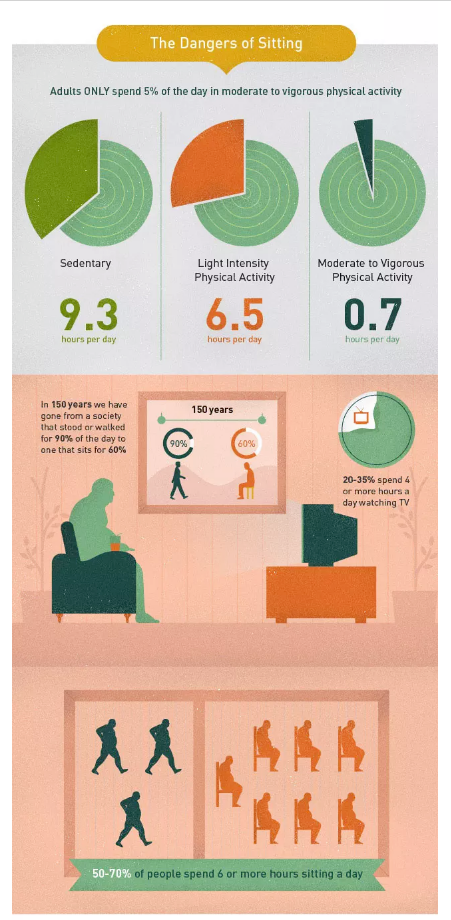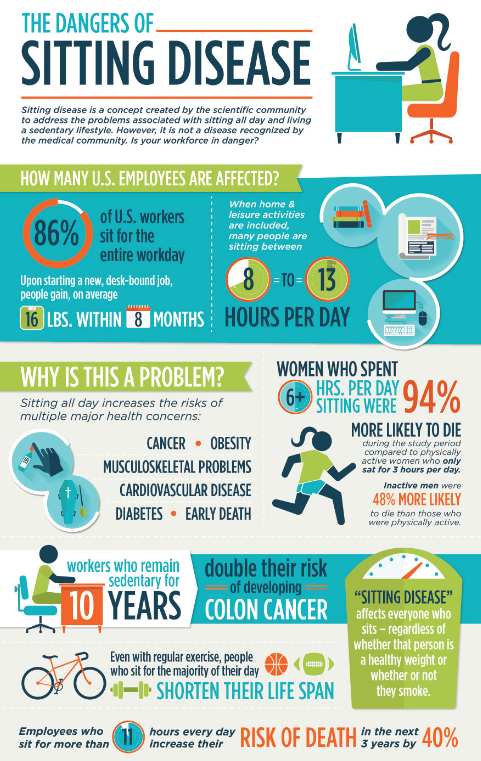
Nowadays, most people spend over 10 hours of their day sitting down.
Most people spend their work day at a desk, and then when they come home they spend the rest of the evening on the couch - sitting down as well.
But our bodies were not built for this!
Our bodies were indeed built to MOVE, to be on our feet and working towards our main goal: survival.
Obviously, this lifestyle has changed a lot in the last couple of thousand years, so what effects does this have on our body, brains and overall health?
Effects on the body
Most negative effects on our body are not only linked to sitting itself - but sitting the wrong way.
Our spine consists of bones, and sensitive disks in between them - covered by muscles, joints and ligaments.
When most people sit for long periods of time, they tend to sit with a curved back and hunched shoulders - this results in a pressure on the spine, a strain on the muscles that stretch to achieve this curved position, and the spinal disks also suffer from it.
When you sit for too long, some parts of your body can actually become numb or swell - that's because the nerve signals can be limited and many arteries and veins are being blocked.
Also, your chest cavity is decreased when you sit - giving your lungs less space to expand, so you get less oxygen intake.

Effects on the brain
When we sit down, it's often because we're using our brain instead of our body(at least at work) but funny enough, this is quite counter-productive.
Like mentioned above, our blood flow and oxygen intake are reduced when we sit for too long - but these are the 2 major elements that our brains need to function properly!
So as a result, our concentration is being reduced if we sit for long periods of time without a break.
Our brain functions generally slow down, as well as the release of mood-enhancing hormones.

Health risks of too much sitting: Statistics
After only 3 hours of sitting, our artery dilation has already decreased by 50% - which means a reduced blood flow.
When sitting for 24 hours straight, our risk for type 2 diabetes is increased because the hormone Insulin loses 40% of its ability to uptake glucose by that point.
After** 2 weeks** of sitting for 6 hours a day, our cholesterol levels are increased, the muscles begin breaking down and weight can be gained more easily.
After 10-20 years of sitting for 6 hours each day, we may lose up to 7 years of quality-adjusted life (life years without a major illness), and the risk of dying from heart disease has increased by 64% !
Shockingly, even a regular workout is not enough to counteract all the negative effects.
Studies have shown that people who sit down for 8 hours a day but also work out 1 hour daily were less affected by above health deficits - but still, even 1 hour of daily activity couldn't counteract the effects completely.
As soon as you sit down for long periods again, the whole process starts again, so you'd really have to stay active regularly to even have a slight chance of fighting the effects!
Solutions?
Standing desks and even Treadmill desks have become quite a popular solution for this problem in recent years.
But also, simply getting up and stretching, taking a little break or ideally taking a walk every hour during the work day can already decrease your health risks, and also refresh your brain and make you more productive.
After reading this post, try making a conscious effort to sit less or get up regularly throughout the day - your body and brain will thank you for it!
Images: 1,2, 3, Logo by @rubenalexander, Sources: 1, 2, 3, 4, 5
- Instagram -

© Sirwinchester

